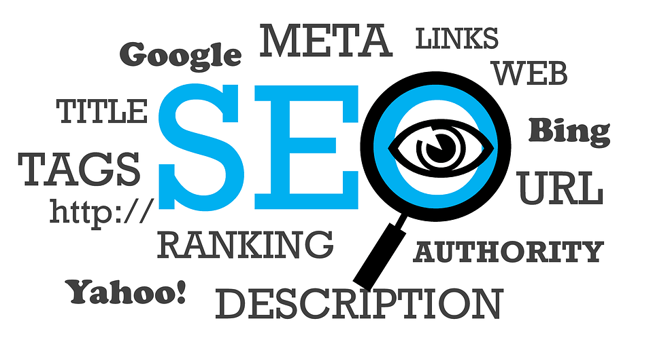How To Write A Great Meta Description To Improve Organic Click-Throughs!
by Will Williamson on 24-May-2017 13:50:20

Optimising a website's Meta tags has always been a big part of Search Engine Optimisation and will continue to be for a long time to come.
It has always been best practice to optimise the different Meta tags for the individual pages on your website. The Meta description is one of these Meta tags. Do you know what a Meta description is or how to write an effective one? Continue reading to find out.
Before we get into writing a great Meta description, I just want to explain briefly what a Meta description is and why they should be optimised.
What Is A Meta Description?
If you are a business owner who is fairly familiar with the SEO community then you will probably know what a Meta description is. If you don't, a Meta description is basically a small snippet of HTML that shows up in the Google search results pages when someone makes a search. This is probably made clearer from the image below. The snippet of text inside the red outline is what is known as a Meta description.

Why Should Meta Descriptions Be Optimised
A good few years ago when SEO was still quite new, Meta descriptions were optimised heavily with keywords to directly impact search engine rankings. Google cottoned onto this and updated their algorithm. They no longer use a Meta description as a direct ranking signal. However, this doesn't mean that they shouldn't be optimised.
Optimising your Meta descriptions individually on each page is still seen as a best practice that Google likes to see. Also, because the Meta description appears in the Google search results page directly below your listing, it has a direct impact on your click-through rate. If you wrote a Meta description that was uninformative or didn't make too much sense, no one would want to click on it. However, if you make it eye-catching and appealing to your audience you can be sure to get increased traffic to your website due to the higher click-through rates from the search results page. Better organic click-through rates is also proven to have a positive impact on rankings.
How To Actually Write A Great Meta Description
Okay, so now you understand a bit more about Meta descriptions, what they are and what their purpose is, we can get into actually writing one. There are a few things you need to consider when writing the perfect Meta description. These are:
Length
The length of your Meta description is really important. No matter how much you write, Google will only show about 156 characters, so keep it short and sweet. Think of a Tweet. It should be a similar length to this.
Keywords
Although including the keywords in your Meta description won't impact on your rankings it is still good to include them for two main reasons. One, to increase the relevance of the Meta description for when someone does a search for that keyword. And two, it makes it stand out more. If someone searches for the keyword that you include in the Meta description, it will make it bold. See the below screenshot as an example.

Remember though, make sure the keyword appears in it naturally and don't over-stuff the description with loads of keywords, only use your main focus one for that particular page.
Readability
It is extremely important that your Meta description reads well and makes sense. Don't use words that are too complicated. Make it short and easy to understand. I have seen many poor examples of Meta descriptions that write for search engines and not for the user, they stuff keywords in and it just looks terrible! So, make sure your description is clear and written for humans.
Uniqueness
Google hates duplicate content. Your Meta descriptions should all be uniquely written and not the same. If you have a Meta description that is the same as another page, change it!
What To Actually Write
What to include in your Meta description and how to write it all comes down to you now. Make sure you include all of the above when you are writing your description. You need to treat it like a short advert, really sell what you are offering and how you can help the searcher. Tap into their core emotions. What is it they are having trouble with? What don't they like about it? How can you help them? Thinking like this and stepping into your customer shoes will help you with what to write. A few things that are good to include in Meta descriptions to increase click-through rates are:
- A call to action
- A reason to believe
- A guarantee
- A special offer, discount or something free
- Capitalisation on certain words i.e. FREE
- Use of punctuation i.e. exclamation marks!
If you take on board all of the above, you will be well on your way to writing great Meta descriptions for your website that boost search engine click-through rates and get you more traffic!
- Inbound Marketing (SEO, PPC, Social Media, Video) (829)
- Strategy (368)
- Sales & CRM (195)
- Marketing Automation & Email Marketing (191)
- Business Growth (167)
- Website Design (161)
- Hubspot (138)
- Lead Generation (117)
- Google Adwords (99)
- Content Marketing (94)
- Conversion (53)
- Case Studies (47)
- News (47)
- Ecommerce (39)
- Webinars (35)
- SEO (26)
- AI (20)
- Events (19)
- LinkedIn Advertising (17)
- Video (17)
- Video Selling (15)
- Software training (13)
- Niche business marketing (11)
- The Digital Prosperity Podcast (10)
- Facebook Advertising (6)
- HubSpot Case Studies (5)
- January 2026 (7)
- December 2025 (15)
- November 2025 (6)
- October 2025 (17)
- September 2025 (16)
- August 2025 (14)
- July 2025 (14)
- June 2025 (5)
- May 2025 (19)
- April 2025 (15)
- March 2025 (13)
- February 2025 (13)
- January 2025 (8)
- December 2024 (2)
- November 2024 (4)
- October 2024 (21)
- September 2024 (4)
- August 2024 (8)
- July 2024 (14)
- June 2024 (16)
- May 2024 (25)
- April 2024 (15)
- March 2024 (18)
- February 2024 (5)
- January 2024 (10)
- December 2023 (6)
- November 2023 (10)
- October 2023 (13)
- September 2023 (12)
- August 2023 (14)
- July 2023 (13)
- June 2023 (14)
- May 2023 (15)
- April 2023 (13)
- March 2023 (14)
- February 2023 (13)
- January 2023 (15)
- December 2022 (13)
- November 2022 (6)
- October 2022 (8)
- September 2022 (22)
- August 2022 (15)
- July 2022 (13)
- June 2022 (16)
- May 2022 (14)
- April 2022 (16)
- March 2022 (17)
- February 2022 (11)
- January 2022 (8)
- December 2021 (6)
- November 2021 (7)
- October 2021 (11)
- September 2021 (10)
- August 2021 (7)
- July 2021 (7)
- June 2021 (4)
- May 2021 (4)
- April 2021 (1)
- March 2021 (3)
- February 2021 (5)
- January 2021 (4)
- December 2020 (7)
- November 2020 (6)
- October 2020 (5)
- September 2020 (9)
- August 2020 (18)
- July 2020 (17)
- June 2020 (17)
- May 2020 (10)
- April 2020 (21)
- March 2020 (24)
- February 2020 (21)
- January 2020 (12)
- December 2019 (23)
- November 2019 (12)
- October 2019 (14)
- September 2019 (16)
- August 2019 (15)
- July 2019 (13)
- June 2019 (6)
- May 2019 (8)
- April 2019 (4)
- March 2019 (2)
- February 2019 (2)
- January 2019 (2)
- December 2018 (3)
- November 2018 (24)
- September 2018 (11)
- August 2018 (9)
- June 2018 (3)
- May 2018 (6)
- April 2018 (14)
- March 2018 (12)
- February 2018 (16)
- January 2018 (15)
- December 2017 (15)
- November 2017 (18)
- October 2017 (23)
- September 2017 (19)
- August 2017 (28)
- July 2017 (27)
- June 2017 (25)
- May 2017 (18)
- April 2017 (17)
- March 2017 (16)
- February 2017 (17)
- January 2017 (14)
- December 2016 (21)
- November 2016 (27)
- October 2016 (25)
- September 2016 (16)
- August 2016 (20)
- July 2016 (19)
- June 2016 (14)
- May 2016 (20)
- April 2016 (24)
- March 2016 (22)
- February 2016 (28)
- January 2016 (27)
- December 2015 (28)
- November 2015 (19)
- October 2015 (9)
- September 2015 (12)
- August 2015 (5)
- July 2015 (1)
- June 2015 (10)
- May 2015 (3)
- April 2015 (11)
- March 2015 (14)
- February 2015 (15)
- January 2015 (12)
- December 2014 (2)
- November 2014 (23)
- October 2014 (2)
- September 2014 (2)
- August 2014 (2)
- July 2014 (2)
- June 2014 (7)
- May 2014 (14)
- April 2014 (14)
- March 2014 (7)
- February 2014 (2)
- January 2014 (7)
- December 2013 (9)
- November 2013 (14)
- October 2013 (17)
- September 2013 (3)
- August 2013 (6)
- July 2013 (8)
- June 2013 (4)
- May 2013 (3)
- April 2013 (6)
- March 2013 (6)
- February 2013 (7)
- January 2013 (5)
- December 2012 (3)
- November 2012 (2)
- September 2012 (1)
Subscribe by email
You May Also Like
These Related Blogs

5 Website Optimisation Tools Compared
Website optimisation (sometimes referred to conversion rate optimisation - CRO) is the process of systemically improving the overall performance and f …

How to Analyse Your Websites On-Site Optimisation
Although Google has continued to evolve and ranking on the first page of Google is harder now than ever before, on site optimisation is still a huge f …

How To Scale Up Your SEO As Your Company Grows
Search engine optimisation (SEO) is a crucial strategy for attracting the website visitors you need to grow your business online, but as your company …




